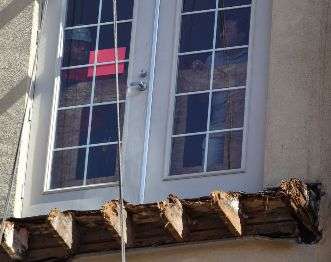Yesterday (June 23), Alex Roshal, the manager of the building and safety division for the City of Berkeley, issued a 10-page memo entitled, “Staff Recommendation Related to Library Gardens Balcony Collapse at 2020 Kittredge Street.”
The report confirms what was already obvious based on the photographs of ends of the broken wooden cantilevered joists of the fourth-floor balcony, which was predictably crowded with a young crowd of tenants and their friends when it collapsed.

Dry rot secondary to water infiltration was the primary cause. Indeed, within hours of the collapse, before the sun even rose, the investigators looked out of the French doors leading to the failed balcony and “observed that the deck joist ends protruding from the exterior wall appeared to be severely dry rotted.” Later that day, inspectors on an outdoor lift “observed that the joist ends protruding from the exterior wall appeared to be extensively rotted at the failure points.”
The report, which can be found here, provides details and clues that will be important to the surviving victims, the family and friends of the deceased, the prosecutors, lawyers, investigators, judges and juries who may one day want to know who, if anyone, bears legal and moral responsibility for this tragedy.
To his great credit, Mr. Roshal begins with thoughtful condolences to the family and friends of those who were killed, and prayers for a quick recovery for the injured. Unfortunately, it will take decades for the pain and loss to lessen for those who were injured or lost a beautiful son, daughter, brother or sister. The civil law recognizes that this pain, loss, and disability is real; that for the injured, beyond the cost of hospital bills, rehabilitation, medical treatment, counseling, and in-home assistance are the persistent physical reminders of injury: pain, isolation, disability, disfigurement, and loss of independence. It is those elements of real human suffering that will be compensated in the civil litigation that almost certainly will follow this tragedy.
Some pertinent facts from the report, and our reaction to them below:
- The five-story apartment complex contains 176 residential units.The BlackRock investment firm reportedly owns the Library Garden complex. BlackRock claims to have $4.77 trillion (that is not a typo) in assets under its management. Indeed, it appears that the Library Gardens was a profitable investment for BlackRock, as units in the complex rent for between $2,150 and $4,000 per month. Assuming 95% occupancy (a reasonable assumption in the white-hot Bay Area rental market of 2015) and an average rent of $3,000 per month per unit, the complex generated $500,000 in monthly rental revenues for BlackRock.The complex is managed by Greystar, a national property management company with 400,000 residences under its management. A property manager typically receives 5 to 10% of rental revenues as compensation for their services. Thus, Greystar likely earns $25,000 to $50,000 every month to manage the Library Gardens. For those sums, owners and managers must make certain that the property is safe, well-managed, compliant with safety codes, and that residents can expect to be notified of latent hazards or hidden deficiencies.This means that the owner and manager have no valid economic excuses for the tragedy. They cannot claim they did not have enough money to make sure the premises, including the balconies, were safe.
- Also, later on, that same day (June 16) holes were cut into the underside of the third-floor balcony (directly beneath the collapsed balcony), and inspectors “determined that the framing members supporting [that] balcony appeared to be dry rotted at the exposed locations potentially presenting a danger of structural failure.”This means the dry rot failure of the fourth-floor balcony was likely caused by systematically flawed design and/or construction practices and not a “one-time” mistake. Rot like this takes time to develop. Periodic preventive maintenance should have disclosed it, and led to an aggressive inquiry and necessary repairs, if any, were required.
- On June 18, two balconies on the second floor of the complex were similarly inspected. They did not use the same type of cantilevered framing system as the third and fourth floor balconies and the inspectors saw “no signs of distress or water damage.”This information provides circumstantial evidence of a potential flaw in design on top of possible errors in maintenance and inspection.
- Investigators compared the plans that the builders of the complex submitted to the city and determined “that the Approved Plans complied with the applicable [California Building Code] requirements in effect at that time, and also that all CBC-mandated inspections were conducted.”The lawyers hired to represent and defend the architects, contractors, owners, and managers will attempt to use these findings as a defense in any criminal or civil proceedings. But common sense tells us that no inspector can be on a job site twenty-four hours a day and that it is typical for periodic inspections to occur at various stages during construction. When the inspectors are not present, we have seen cases where shortcuts were taken, where best construction practices were ignored and the end result is one or more structural or cosmetic defects. Indeed, the eastern span of the new Bay Bridge was constructed according to code and all necessary inspections were carried out-and yet we now learn that best practices were not followed, that the bridge may well be unsafe down the road, and that best practices were not used. Under California law, the inspecting agencies, whether state, county or city, have no liability for failure to inspect – the obligation to construct correctly and in accord with plans, designs and codes resides loosely with the owner and builder. Government approval of plans or periodic inspection approval provides no defense to a claim of civil wrongdoing.
Anyone looking for more information on this topic is invited to call us at (415) 981-7210 or contact Walkup partner Mike Kelly, who has been obtaining multi-million dollar recovery for victims of similar tragedies for more than 35 years.


